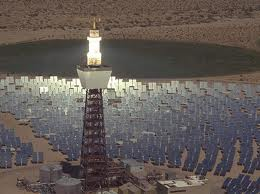In February, Germany will begin offering incentives for people to tie energy storage systems to their solar arrays.
The three-year subsidy program is for relatively small solar systems, less than 30 kilowatts, that send electricity to the grid. Grants of $1080 will be available for each kilowatt hour of energy storage added. The program is capped at $67 million.
This new, if temporary addition to Germany’s feed-in law is meant to reduce peaks in electricity production and take pressure off the grid.
Storing excess energy in batteris can reduce peaks in electricity production up to 40% and grid capacity by 66%, according to Fraunhofer Institute for Solar Energy Systems.
California Solar Plant W/ Energy Storage
The first large-scale solar plant in California that includes energy storage starts construction early next year, after having been approved to sell the energy to PG&E.
SolarReserve’s 150 megawatt Rice Solar Energy Project now has all its permits. Located in eastern Riverside County and bearing a $750 million price tag, it’s expected to generate more than 5,300 solar jobs (direct and in-direct) during its 2-year construction period.
When complete, the project will supply power to over 65,000 homes during peak electricity periods.
The solar tower design focuses sunlight from thousands of mirrors onto a central tower that contains molten salt, which retains heat and can produce power at night.
There will be 8-10 hours of fully dispatchable energy storage, a key factor in the project’s approval. In fact, more than 20 hours of full power energy storage is possible, making it equivalent to coal, natural gas and nuclear plants.

SolarReserve’s flagship 110 MW Crescent Dunes Solar Energy Project in Nevada comes online late this year – the first commercial scale molten salt tower in the world.
Another 150 MW project has been approved in Arizona, the 150 MW Crossroads Solar Energy Project.
California’s Public Utilities Commission (CPUC) has rejected solar project proposals because they lack energy storage and is considering approving only those plants that have it.
